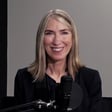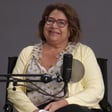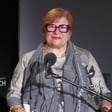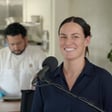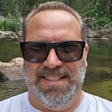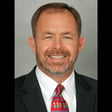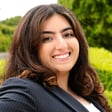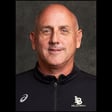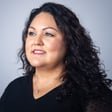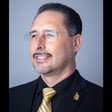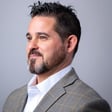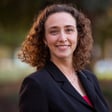Become a Creator today!Start creating today - Share your story with the world!
Start for free
00:00:00
00:00:01

S1 - E6: Sustainability and Earth Month at The Beach
Transcript
Introduction to the At the Beach Podcast
00:00:17
Speaker
Hi, I'm Dan Montoya, Vice President for University Relations and Development, and your host of At the Beach. Welcome. This podcast is produced by University Relations and Development to share news of accomplishments, honors, personal stories, and ways listeners can become involved at Cal State Long Beach.
Meet Holly Fajak: Sustainability Advocate
00:00:35
Speaker
My guest today is an appropriate one for Earth Month, Holly Fajak. Holly is a sustainability manager at the beach and a co-chair of the President's Commission on Sustainability.
00:00:46
Speaker
Holly has a diverse background with experience in environmental education, policy analysis, sustainability consulting, communications and media, and fine art. She also has experience in working with higher education institutions, private firms, nonprofit organizations, and local governments. Welcome to At the Beach and Happy Earth Month at the Beach. Thanks, Dan. Happy to be here. Thanks for inviting me.
00:01:12
Speaker
Well, it's good to have you and we just want to engage in a really good conversation about, you know, Earth Day sustainability and so on and so forth. Earth Day, which helped drive so much of the, in the way of awareness, has led us to celebrations like the Beaches Earth Month.
Urgency of Environmental Action in California
00:01:30
Speaker
What's your take on the health of the environment? Are we improving things or have things slipped backwards?
00:01:39
Speaker
Well, I mean, I can't sugarcoat it. The situation is pretty serious. The latest IPCC report that came out last year, basically,
00:01:53
Speaker
was sounding the alarm bell that we are kind of running out of time to take dramatic action. Climate change is accelerating, and there's a lot of impacts that we're already facing. And we see it right here in California with extreme heat and all the rain that we've been having. Things are just kind of not the way they've been in the past.
00:02:13
Speaker
I think there is a sense of urgency, but we aren't completely out of time. We just need to kind of accelerate the pace of change and get people aware of the issues so that they can be part of the solution. There is a lot of progress being made, especially here in California. We're leading the way in things like renewable energy adoption. So there is hope, and we're just trying to do everything we can to get everybody on the same page about
00:02:42
Speaker
this existential crisis that we're facing as humanity. You sense it, you see it, and you experience it, and you realize there's something different going on. Tell me more about your work and your colleagues on the sustainability team here specifically at Cal State Long Beach.
Sustainability Initiatives at CSULB
00:03:03
Speaker
OK, so our Office of Sustainability has only been around for about 10 years. I was the first person hired as a sustainability officer for the campus back in 2014. And over that time, we've just really seen the program grow. The work that we're doing is kind of both on the operations side and on the education and engagement side. We're housed in Beach Building Services, which is the campus's facility department. So we work with our colleagues there to promote
00:03:33
Speaker
different energy projects, conserving water, we're really involved with our zero waste program. And then on the other side, we're doing events like Earth Month, our big green generation showcase, for example, and also working with faculty on helping train them to integrate sustainability into the courses. So the students are learning about this as well.
00:03:53
Speaker
Our work kind of runs the gamut, and we're really lucky to get to work with pretty much everybody across the university on various initiatives. And it's a lot of fun. It's kind of, you know, I always say the best part of the job is the worst part of the job, which is that there's just so much to do, but you never get bored. That's one good thing.
00:04:12
Speaker
Yeah, that's good. And it's so nice for you to be able to work with the campus as a whole because you see so many different things that a lot of people wouldn't necessarily realize that is happening here at Cal State Long Beach. Yeah, I think a lot of people, you know, they're sort of in their one little silo of the campus and doing their good work. The good thing about sustainability is that it touches so many aspects of what we do here.
00:04:38
Speaker
Yeah, I get to work with a lot of great people and students and faculty and we have our President's Commission on Sustainability, which has a lot of our great campus leaders that care about these issues. So it's very rewarding in that way.
00:04:52
Speaker
Maybe it'd be helpful to even just come down to the basics of what's sustainability, right? Because a lot of people, you know, they think about, you know, recycling or different things, but sustainability is, there's so much to it, right? You know what, maybe just a real quick definition of what it is.
00:05:12
Speaker
Well, I mean, I could write a dissertation on that topic. But yeah, I mean, when we ask students, what does sustainability mean to you? It's funny. The number one answer is recycling, which is sort of ironic because recycling is sort of the last
00:05:28
Speaker
Result that you want you really want to reduce the amount of resources you're using to start with so sustainability is kind of about a mindset of How can we adjust the way that we live on this planet so that we're in harmony with it? And not just thinking about the end use like oh now I'm gonna put in the recycle bin and everything's gonna be okay. That's really kind of been the
00:05:49
Speaker
the line that's been fed to us ever since we were children. But it's much more than that. Sustainability is also a conversation about equity because the greatest impacts of things like climate change are being inflicted on those with the least resources and the most underserved and underprivileged people in our
00:06:12
Speaker
world so when we're talking about sustainability it's about you know how can we address those inequalities and inequities so that people are all being supported and allowed to live on a healthy planet. You know we were just talking earlier about how a lot of times industry and different areas are polluting communities that don't have the political power or the voice so you know they end up getting the worst of the impacts.
00:06:40
Speaker
Wow. See, I think that is so helpful to just frame it with some kind of understanding of what it is and how it impacts everything we do. And so is there a master plan of sustainability here at the beach?
CSULB's Climate Neutrality Goals
00:06:57
Speaker
Yeah, I mean we have our Climate Action and Adaptation Plan, which we updated in 2022, and that's sort of our roadmap for guiding the campus towards climate neutrality. We have a target year of 2040 to achieve climate neutrality, meaning we're offsetting as much emissions as we're producing.
00:07:16
Speaker
which is a really ambitious goal, especially given that about 60% of our emissions come from people commuting to campus, and we are a commuter campus. I know we are increasing the amount of housing we have for students, but that's a big challenge.
00:07:31
Speaker
So, yeah, our Climate Action Adaptation Plan, otherwise known as our CAP, also addresses the adaptation piece, which is, you know, we know that climate change is already happening. We're experiencing it. How can we adapt our campus so that we can be resilient? Both on the facility side, like things like, you know, conserving water and making sure our landscaping is drought tolerant.
00:07:51
Speaker
increasing the amount of trees and shade we have because, you know, obviously it's getting hotter. We want to have as much shade as possible. And then also supporting our students because, you know, supporting their basic needs is part of making a resilient campus as well. So all of that is kind of encompassed in our plan. That's great. And so is there any specific examples of here at the beach or specific projects that you're currently working on that you could share with us?
Engaging the Campus with Green Programs
00:08:20
Speaker
Yeah, I mean, I think this year we really put a lot more emphasis on the engagement side. We launched several new programs this year to try to engage students, faculty, and staff. One of the programs that we launched early in the year was our green events program.
00:08:36
Speaker
which was actually the brainchild of one of our student assistants in our office. So he was really passionate about, you know, he loves going to music festivals and sporting events and his dream is to ultimately be like a sustainability professional in those spaces. So he wanted to create a green events program here. So we got behind that and we really pushed it hard.
00:08:58
Speaker
And so, you know, now we have a training so people can take this training to learn how they can make their events more sustainable and more equitable and inclusive because, you know, another aspect of sustainability is how, how are we engaging all people, you know, based on their
00:09:13
Speaker
different backgrounds, but also their abilities, so making sure that events are accessible is part of this program as well. So that's just one example. We also launched a sustainability champions program for employees, and so we meet once a month and talk about different sustainability topics, and then they can go back into their department or their area of campus and spread that information across their colleagues.
00:09:34
Speaker
And then we're currently accepting applications for a new program that will launch in the fall called Sustainability Fellows and that's going to be a student leadership program that is developed by the President's Commission on Sustainability and students will be able to get training and sort of recognition for things that they're doing on campus and in their community to support sustainability and then at graduation they'll get you know like a green cord for their
00:09:59
Speaker
recognition and a certificate and a letter from the president. So just trying to get more people involved in the things we're doing so that they feel like part of the effort. And it's not just me and my one employee in the sustainability office trying to do it all. And that's great. It's great to hear. So if people wanted to get involved with that, you know, go to the website and look it up. Yeah. So CSULB.edu slash sustainability has all our programs.
00:10:24
Speaker
Good. Yes. And again, we encourage folks to participate and go there and sign up for different opportunities, because there is a lot of opportunities here at the beach. So in regards to Earth Month, you know, are there highlights of Earth Month events coming up at the beach this year?
00:10:42
Speaker
Yeah, so this week we have our 13th annual Green Generation Showcase. It's going to be at the Japanese Garden where it always is. And this is a really, this is kind of our flagship sustainability event that we do every year, not including COVID years, but we did do it virtually those years. And it's a great celebration of student work. So we basically,
00:11:09
Speaker
put out a call for projects and students submit projects from any discipline that have some relation to sustainability issues or solutions. This year we got over 90 projects. So putting them all on display is gonna be a challenge, but we'll figure it out. We also invite campus and community partners to table at the event so that people can engage with them and figure out how they can get involved in volunteer opportunities or internships or whatever.
00:11:38
Speaker
So we have over 20 organizations going to be tabling. And then the students will potentially win awards for their projects as well. We also have a raffle. We have some pretty good prizes. So if people want to come down, it's open to everybody. And if you miss this year's event, look out for next year's event. It'll probably be even bigger and better.
00:11:58
Speaker
That's great. So you kind of alluded to the next question I had is in terms of do you do work with the CSU, City of Long Beach or other state and local federal agencies on sustainability? Yeah. You know, since I've been in my role for about 10 years now, I've become really close with sustainability officers at other CSU campuses. We have a pretty tight network of sustainability officers and there's a lot of collaboration across the system.
00:12:26
Speaker
And we've worked together on system-wide policies like the ban on certain single-use plastics that went into effect a couple years ago. So yeah, there's a lot of collaboration across the system. We also work with our city partners in Long Beach Utilities and the City of Long Beach Office of Sustainability.
00:12:47
Speaker
on various initiatives. They're going to both be here at our event this week. And we've worked with Long Beach Water on rebate programs for converting landscaping to save water and stuff like that. So we're always trying to connect with them on opportunities that are mutually beneficial.
00:13:04
Speaker
At the federal level, not so much, but there's things like the Inflation Recovery Act, which is going to have some funding for renewable energy projects. So we're keeping our eye on things like that to see if there's ways that we can leverage those funds to expand our goals here on the campus.
00:13:24
Speaker
That's great. Again, there's just so much to it. And when we think of sustainability, some people think, oh, just boring. But there's- They do? Yeah. Well, you would think so, right? Sustainably, what's that? It's not what you would say in quote, a sexy topic, right? But it is so relevant because it's everything that we do. It's in everything that we do. We walk past the parks and don't realize how
00:13:51
Speaker
Our actions affect everything that happens with the grounds and everything else. It's just such a fascinating topic. Yeah, it's sort of strange because a lot of people consider sustainability to be sort of a concern of the elite. It's like the Tesla driving, Whole Foods shopping.
00:14:12
Speaker
Solar panel house having people you know whereas on the other side There's other people that are like this is just what my family has done forever. You know like my mom saves the butter Jug and puts you know leftovers in it like you know we hang our clothes out to dry like there's just practices that culturally are just inherently sustainable Which aren't sort of framed in this? You know shiny green you know packaging or whatever
00:14:42
Speaker
Yeah, and I could totally relate to that, you know, hanging clothes and yeah, I totally get that. So let's kind of bring it down to you a little bit more and talk about, you know, how you got interested in this topic of environment and sustainability and what is it that motivates you to stay, you know, in this space and then more importantly, why here at the beach?
00:15:07
Speaker
Well, I kind of have a strange origin story compared to my counterparts at other campuses. I actually studied art and photography in my undergrad, and when I came out to LA after college, I ended up working for a company, a media company, that happened to focus on environmental media.
00:15:30
Speaker
It was just sort of by happenstance. And I became exposed to those ideas and those topics and the issues that we're facing and the climate crisis and everything. And I kind of felt like once you know those things, you can't unknow them. And I wanted to be part of that conversation and part of that movement. So I ended up volunteering for an organization that did environmental education.
00:15:54
Speaker
and then they had a position open up, I ended up working there and then at a certain point I realized I could only get so far with my photography bachelor degree so I went back to grad school and kinda got more credentials under my belt and then this was the first job I got out of grad school and I've been here ever since and I think I realized pretty early on that working with students was a passion for me because you know the climate crisis is so
00:16:24
Speaker
overwhelming. And when you're working with students, you know, it's kind of like that ripple in a pond effect, you know, you kind of impact one person and the ripples affect all of their communities and all the people that they touch and work with. So I guess I feel like even though I'm only one person, when I'm working with students, my impact can be exponential. And it's just, you know, they're just at this really amazing point in their life. And it's, it's very rewarding to kind of act as a mentor,
00:16:54
Speaker
help them understand these issues and how they can be a force for good in the world so that's kind of why I wanted to stay in higher ed sustainability as opposed to maybe like corporate sustainability or some other avenue and you know the beach is just a great place to work it's a beautiful campus some amazing students and great colleagues so you know I'm
00:17:21
Speaker
That's why I'm still here. So is there, I mean, just kind of going back to the students, is there any themes or any behaviors that you're seeing is just consistent with this these generations that are coming through right in terms of how they see the environment and in terms of what the things they think about or maybe the questions that they ask?
00:17:42
Speaker
I'm sorry to say that I think climate anxiety is becoming a much greater issue, understandably, and a sort of sense of frustration that the generations that came before them have not taken this problem seriously.
00:18:00
Speaker
And, you know, they're not wrong. So again, we just try to focus on what can we do and, you know, what impact can we make because the problem is pretty overwhelming if you just sit and focus on it. But yeah, I think students are really hungry for solutions and actions that they can take to make a difference. So we try to provide those as much as we can. That's great. So, you know,
00:18:31
Speaker
University Relations Development is really focused on fundraising and also strategic communication, government relations, and really just helping facilitate relationships with the university in so many ways.
00:18:46
Speaker
So I just want to know how can those interested in being part of sustainability at the beach do so? What actions can they take to participate? I mean, we've kind of talked to you about the website and some of the projects, but what are some things that they can participate in? And more importantly, if there's needs for funding, what are they?
00:19:10
Speaker
Okay, yeah. I mean, one of the events I didn't mention previously that's happening during Earth Month is a beach cleanup that is being co-sponsored by the College of Business, the CSULB Alumni Foundation, and League of Women Voters, and also Senator Lena Gonzalez and City Council member Christina Dugan.
00:19:31
Speaker
So that's going to be on the 20th of this Saturday. So people can get involved with that. That would be a way to connect with our sustainability community, both kind of at the city level and at the campus level.
00:19:47
Speaker
funding opportunities. We have been envisioning a project for many years called the Center for Sustainable Future.
A Vision for a Sustainability Center
00:19:55
Speaker
One of the things that we've realized is that we don't have a physical space on campus that is dedicated to sustainability.
00:20:04
Speaker
you know, my office is not a space for students to convene or hang out or learn about these things. So we've realized that having a physical location where we can have programming, we can have educational talks, we can have different types of events, we can have ongoing displays and things like that and showcases of student and faculty work is really going to take our sustainability efforts to the next level and allow us to connect with way more students than we currently are able to do.
00:20:33
Speaker
So, that is a project that we are really excited about and hope to move forward. We're currently in the fundraising phase for that. So, if anybody's interested in being a sponsor for the Center for Sustainable Future, please let us know. How big is the project? How much is the total cost for that project?
00:20:53
Speaker
I think it's about $3 million. And there's naming opportunities, there's space opportunities. There's naming opportunities, there's several different areas that could be sponsored and highlighted. So we do have a seed funder, so we're getting the ball rolling and that's exciting, but a little ways to go to get over the finish line for that.
00:21:15
Speaker
We also have, you know, we do have a fund on the CSULB Give website for the President's Commission on Sustainability, and funds donated to that could go towards programs such as our faculty workshop, the Climate Justice and Sustainability Curriculum Workshop, which we hold once a semester where we train faculty on these topics and how they can integrate them into their courses.
00:21:38
Speaker
So that's a great program because, again, those faculty are teaching hundreds of students these topics and their impact can kind of have a ripple effect. So that's another way you could support as well. That's great. I think of philanthropy as
00:21:52
Speaker
Kind of like a superhero power for many people, because a lot of people don't realize that their philanthropy just doesn't affect the moment. It affects future generations, like when you give a scholarship or when you support sustainability programs. It's not so much that you're sponsoring the moment, you're sponsoring what the future is. And so I think these are great opportunities for people. People always talk about,
00:22:19
Speaker
hey, I want to I want to do something that's greater than me and leave something that's impactful, even greater than me when I'm gone or whatever. And these are just great examples. Because, you know, if we think about sustainability, we think about the environment, we think about the future we want, you know, we're about to launch our 75th year celebration of this institution, we want to celebrate another 75 years in the future. And all those
00:22:42
Speaker
steps that we take now will actually lead us to a successful next 75 years. I really want to appreciate all the stuff that you do in your sustainability program and all your colleagues. I've had the opportunity to do some work with you.
00:23:00
Speaker
But I'm excited to learn more as a continual student and life learner. I mean, this is so great. And this is why we love to do this podcast because it's really designed to highlight areas of the university most people wouldn't really think about. So I really appreciate you taking the time and I'll just leave you with an opportunity to say any final thoughts before we close it out.
00:23:25
Speaker
Sure. Well, if you want to get more involved, Dan, you can join our Sustainability Champions Program.
The Role of Philanthropy in Sustainability
00:23:30
Speaker
All right. We're also planning to launch a green office program next year so you could have your division be the pilot division to launch that program. And I guess I would just say, to your point earlier about the impact that philanthropy can make and just the work we do as students here,
00:23:48
Speaker
I mean, I think we all take pride in preparing students for the world that they're going to inherit and for success in their futures. But my perspective is that if we don't prepare them for the world, the changing world, the climate changed world that they're inheriting, then we're doing them a disservice. So anything we can do to kind of raise their awareness about this really pressing challenge that is going to be a part of every single person on this planet's life, the better.
00:24:15
Speaker
Yeah, I 100% agree. And I'm so excited. I'm going to take you up on those offers. And so I'll connect with you in the future. But it is so nice talking to you and spending the time. I appreciate your efforts to empower people here at the beach and elsewhere to become agents of positive change. For Cal State Long Beach and its Division of University Relations and Development, I'm Dan Montoya. And we're going to end with a Go Beach on three. One, two, three. Go Beach.
